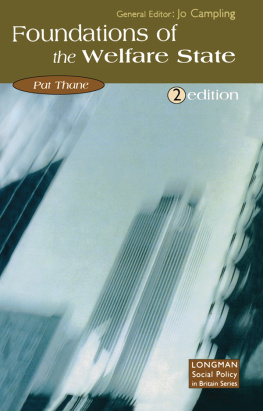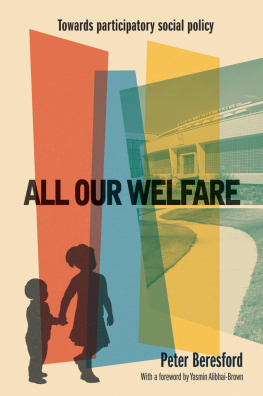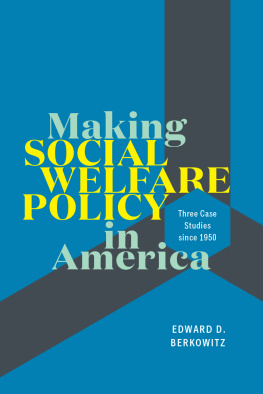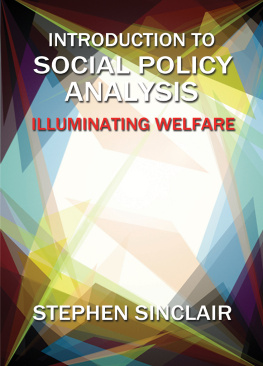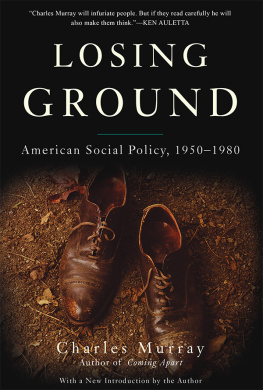FOUNDATIONS OF
THE WELFARE STATE
LONGMAN SOCIAL POLICY IN MODERN BRITAIN
Series Editor:
Jo Campling
Published Titles:
The Personal Social Services
Robert Adams
Health Policy and the NHS
Judith Allsop
Housing Problems and Policies
Brian Lund
Crime and Criminal Justice Policy
Tim Newbum
Elderly People and Society
Anthea Tinker
Equal Opportunities and Social Policy
Barbara Bagilhole
Responding to Poverty
Saul Becker
Forthcoming Titles:
New Directions in Educational Policy
Paul Lodge
Lone Mothers
Jane Millar
LONGMAN SOCIAL POLICY IN BRITAIN SERIES
Foundations of
the Welfare State
Pat Thane
2nd Edition

First published 1982 by Pearson Education Limited
Second edition published 1996
Published 2013 by Routledge
2 Park Square, Milton Park, Abingdon, Oxon OX14 4RN
711 Third Avenue, New York, NY 10017, USA
Routledge is an imprint of the Taylor & Francis Group, an informa business
Pat Thane 1996
All rights reserved. No part of this book may be reprinted or reproduced or utilised in any form or by any electronic, mechanical, or other means, now known or hereafter invented, including photocopying and recording, or in any information storage or retrieval system, without permission in writing from the publishers.
Notices
Knowledge and best practice in this field are constantly changing. As new research and experience broaden our understanding, changes in research methods, professional practices, or medical treatment may become necessary.
Practitioners and researchers must always rely on their own experience and knowledge in evaluating and using any information, methods, compounds, or experiments described herein. In using such information or methods they should be mindful of their own safety and the safety of others, including parties for whom they have a professional responsibility.
To the fullest extent of the law, neither the Publisher nor the authors, contributors, or editors, assume any liability for any injury and/or damage to persons or property as a matter of products liability, negligence or otherwise, or from any use or operation of any methods, products, instructions, or ideas contained in the material herein.
ISBN-10: 0-582-27952-6
ISBN-13: 978-0-582-27952-0 (pbk)
British Library Cataloguing-in-Publication Data
A catalogue record for this book is
available from the British Library
Library of Congress Cataloging-in-Publication Data
Thane, Pat.
Foundations of the welfare state/Pat Thane. 2nd ed.
p. cm. - (Longman social policy in Britain series)
Includes bibliographical references and index.
ISBN 0-582-27952-6 (pbk.)
1. Great BritainSocial policy. 2. Welfare state. 3. Great
BritainEconomic policy. I. Title. IL Series.
HN385.T43 1996
361.6T0941dc20
96-18829
CIP
To the memory of my grandparents, who lived through much of this.
CONTENTS
This series, written by practising teachers in universities and polytechnics, is produced for students who are required to study social policy and administration, either as social science undergraduates or on the various professional courses. The books focus on essential topics in social policy and include new areas of discussion and research, to give students the opportunity to explore ideas and act as a basis of seminar work and further study. Each book combines an analysis of the selected theme, a critical narrative of the main developments and an assessment putting the topic into perspective as defined in the title. The supporting documents and comprehensive bibliography are an important aspect of the series.
Conventional footnotes are avoided and the following system of references is used: superior number in the text refers the reader to the corresponding entry in the references at the end of the chapter. A number in square brackets, preceded by doc [docs 6, 8], refers the reader to the corresponding items in the section of documents which follows the main text.
Unlike most existing textbooks on the history of social policy, this book does not focus narrowly on social legislation and pressure groups, but argues that social policy can only be understood in the context of broader social, economic and political structures and changes. In particular, Pat Thane stresses that social policy must be discussed in close association with analysis of the economy and of economic policy. She also looks briefly at the experience of social policy in other countries. This is done partly to demonstrate that the British experience has not been uniquely progressive, and partly in the belief that such comparative analysis is necessary if we are to understand what are the leading pressures for, and constraints upon, further redistribution through welfare measures.
Jo Campling
Many of my friends have groaned audibly at the prospect of yet another survey of the history of social policy. I have happily ignored them for two reasons: firstly in the past decades many new studies have been published of aspects of social policy in the previously neglected period between 1918 and 1945.1 felt that it was time for them to be synthesised and made available to a wider audience. Secondly, too often the development of social policy is examined within too narrow a framework. Like other aspects of government activity it cannot be fully understood by examining legislation alone. Social legislation is the product of structures, pressures and values in society, politics and the economy as a whole. I have tried, however inadequately, to place the study of social policy in this wider context. Also, to evaluate changes in social policy within one society, it is desirable to compare them with changes in other societies in order to discover what is and what is not particular to the British experience. This has been done with regrettable brevity to avoid producing too unwieldy, or too costly, a book.
The book begins in 1870 because it is concerned with state welfare and I believe that it was around that time that important demands began to arise for the state in Britain to take a permanent, as distinct from a temporary and residual, responsibility for the social and economic conditions experienced by its citizens. Although the scope of these state responsibilities gradually widened, it was not until after the Second World War that a government formally acknowledged that the welfare of the mass of its citizens was a major component of its activities and announced the dawning of a welfare state. The book ends with this beginning. The requirement of the series of which it forms part was that I should end in 1945.1 have overstepped this date a little, since so much of the legislation of the post-war years is inextricably linked with the post-war discussions and proposals, but in order not to tread too far into the territory of later books in the series I am aware that my treatment of post-war legislation has been all too inadequate.
My final justification for writing the book is that I hope it will fulfil a need among students required to study this period and among others interested in how and why British social policy took the form it did after 1945, a form which has remained the basis for much state social provision since then. At a time when the post-war welfare state is actively being dismantled there is perhaps an especial need to understand the forces which can oppose, promote or defend state measures to meet social needs.
Next page
